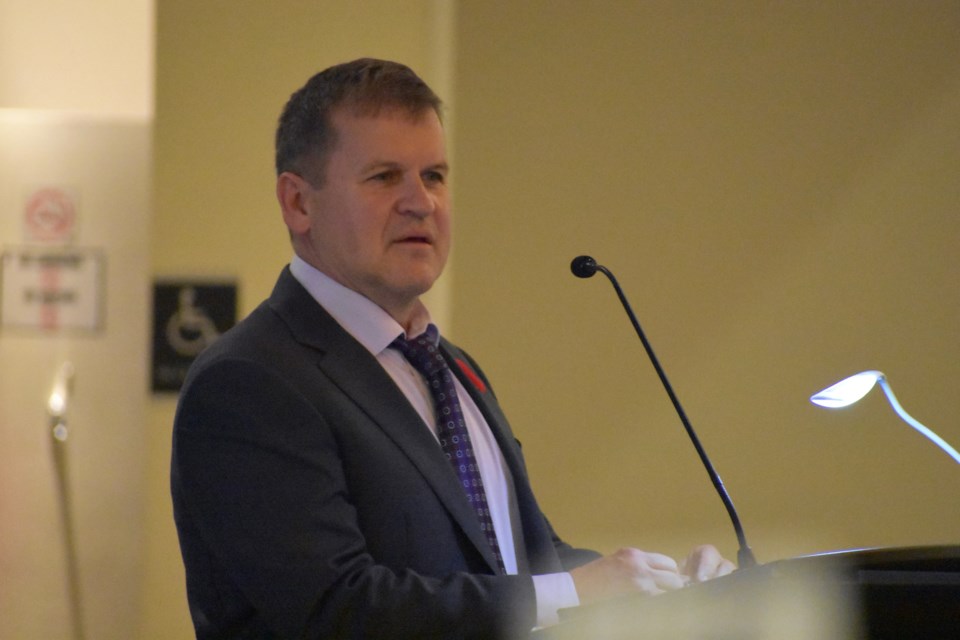Tony Makuch, the former president-CEO of Kirkland Lake Gold, is on the move.
Agnico Eagle Mines, the new mining kingpins of the Kirkland Lake gold camp, introduced Ammar Al-Joundi as its new president-CEO and announced that Makuch has departed as CEO and a director of the new and expanded company.
Agnico presented its fourth quarter and 2021 production performance during a conference call with mining analysts on Feb. 24.
Toronto-based Agnico recently closed its $13.4-billon deal to acquire Kirkland Lake Gold in the so-called "merger of equals."
Makuch's decision is a sudden reversal from two weeks ago, when it was announced that he would be staying on with Agnico as its CEO with Al-Joundi filling the president's role under Sean Boyd, the executive chair.
In his remarks, Al-Joundi wished Makuch the best of luck, calling him a "man of integrity" and a "good human being" who "will be successful at whatever endeavour he does next."
In 2021, Agnico Eagle posted a record annual gold production of 2,030,176 ounces from its operations in western Quebec, Nunavut and Mexico. The company also boasts a 44.6-million ounce reserve, that too all-time record.
In releasing their company-wide three-year guidance figure of 3.2 million to 3.4 million ounces, Agnico officials spoke about filling producing a steady and ongoing stream of quality mines that begins with a strategy of aggressive exploration programs.
In "building value through the drill bit," the company said it's investing $324 million in exploration across the company's assets and $700 million in development capital.
Its two newly acquired mines in northeastern Ontario will scoop up a big chunk of that.
The Agnico team enthusiastically talked up the open-ended expansion potential at the Detour Lake open-pit mine, north of Cochrane, already considered a top-six asset in the Agnico fold.
Kirkland Lake Gold made a number of new discoveries at Detour in 2021 that Agnico plans to follow up on with a massive exploration program with 234,000 metres to be drilled in 2022. The exploration team will be zeroing in again on the West Pit and Saddle areas in looking to extend gold resources at depth and to the west.
"Detour, frankly, has the potential to be one of the best gold mines in the world," said Al-Joundi, "in one of the best jurisdictions in the world."
A new technical report with an updated resource calculation and revised mine plan comes out mid-year. Al-Joundi said there's a real likelihood they could add more than 10 million ounces to the resource base.
"They're almost finding gold faster than we can figure out a mine plan to mine it," said Al-Joundi, in mentioning Detour's geological potential that could extend operations for decades.
At the Macassa Mine Complex in Kirkland Lake, 150,000 metres of both underground and surface is in the cards to chase mineralization to east, west and extensions deeper down, and to drill off new targets in the middle part of the mine above the South Mine Complex.
Al-Joundi and his team are eager to unlock Macassa's full potential.
Development on the new No. 4 Shaft is ongoing with that project about a year away from being operational.
But a real challenge has surfaced at Macassa regarding production.
Agnico revealed they're having unspecified issues with its underground electric fleet of vehicles, a challenge that's been holding back the mining rate of an "exceptional mine" with plenty of untapped high-grade gold.
Al-Joundi said the previous Kirkland Lake Gold management did an "exceptional job" in modernizing a 1930's era mine. Years ago, the company made a cutting-edge decision to switch from conventional diesel equipment to battery vehicles due to Macassa's unsuitable ventilation system.
"To their credit, they've done a tremendous job but they were probably five years ahead of the technology," he said.
Al-Joundi said the battery issue is one they take very seriously and he feels they are making progress.
"When we were there (Kirkland Lake) in the summer we asked the team, 'If you had the ventilation, would you like to have diesel?' and the answer was, 'yes.'
"It is option we're looking at. To be sure, the future in underground mining is electric. But it's probably another 10 years away."
He doesn't expect the battery issue to be a constraint much longer.
"Either the technology gets better and we use it, or it doesn't and we're using diesel."
Expect to see a hybrid fleet of both battery and diesel vehicles at Macassa, he said, allowing them to get the mining rate up to 350,000 to 400,000-ounce producer rather than be a 200,000-ounce producer.
"We can't be dealing with this indefinitely, and we don't expect to," said Al-Joundi.



